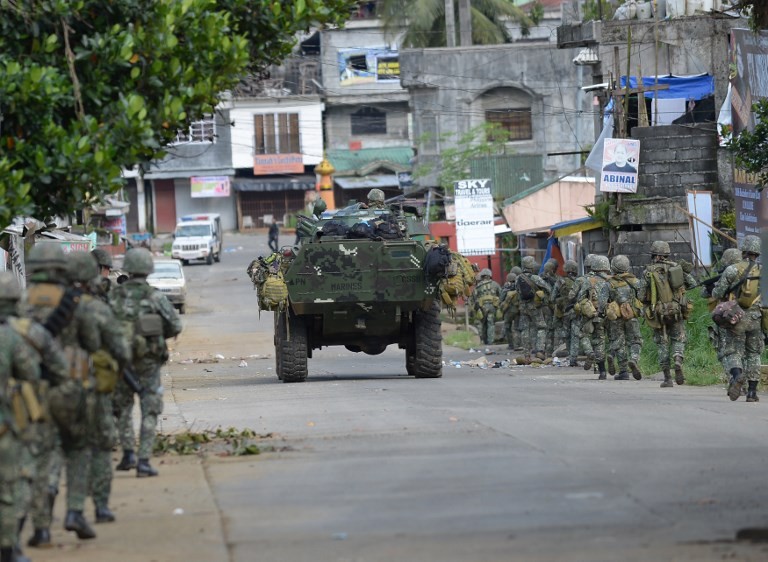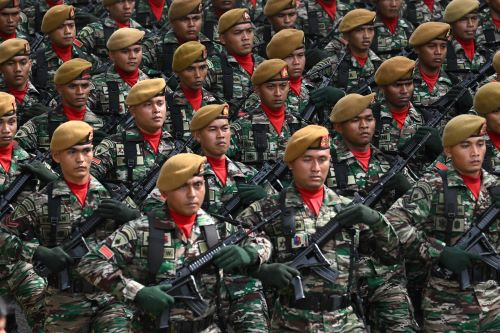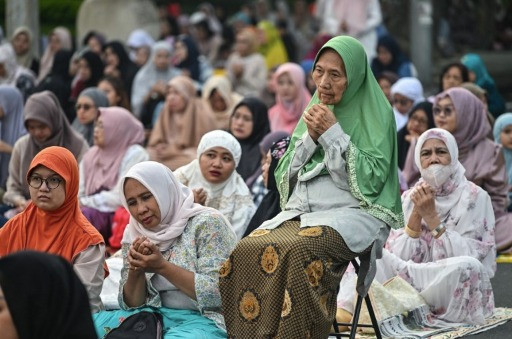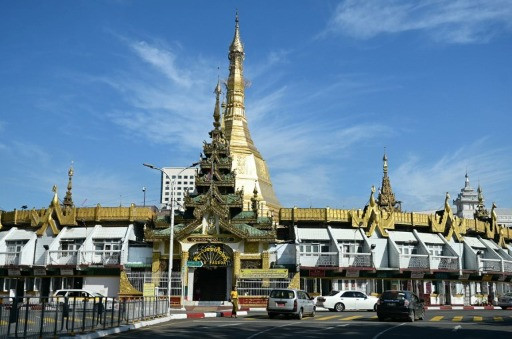Non-interference hinders ASEAN fight against IS
The growing threat of IS calls for better coordination in fighting them.
Change Size
 Police special forces prepare to assault the hide-out of militants near the city hall in Marawi, in southern island of Mindanao on May 28, 2017. Islamist militants who have gone on a rampage in a southern Philippine city have killed 19 civilians including women and children, the military said on May 28, as fighting entered the sixth day.
(AFP/Ted Aljibe)
Police special forces prepare to assault the hide-out of militants near the city hall in Marawi, in southern island of Mindanao on May 28, 2017. Islamist militants who have gone on a rampage in a southern Philippine city have killed 19 civilians including women and children, the military said on May 28, as fighting entered the sixth day.
(AFP/Ted Aljibe)
T
he attack on Marawi in the southern Philippines that claimed 103 lives was the deadliest in Southeast Asia so far. It was a response to calls of reinforcement by Isnilon Hapilon, the Filipino militant dubbed the “Emir of Southeast Asia” allegedly linked to the Islamic State (IS). When Hapilon was hunted and surrounded by the military, hundreds of local Maute group militants poured into southern Mindanao and flew the black flag of IS.
Although transnational crime and terrorism is nothing new in the region, especially along the border between the Philippines, Indonesia and Malaysia, the attack was shocking not just due to its unprecedented scale, but also for its unprecedented level of transnational coordination.
Previously, despite a declaration of their affiliation to overseas militant organizations, most terrorism activities in Southeast Asia were carried out by local citizens. Several militia in the Philippines are known for taking hostages for ransom rather than ideology. Nevertheless, the Marawi attack, although carried out by local groups, was a coordinated assault led by a regional figure and involving foreign soldiers. During the press conference after the initial clash, Solicitor General Jose Calida said, “What's happening in Mindanao is no longer a rebellion of Filipino citizens. It has transmogrified into invasion by foreign terrorists.” He argued that the attack was IS’s attempt to make Mindanao part of the caliphate, also involving terrorists from Indonesia and Malaysia.
This phenomenon reflects deepening ties between terrorist groups across the region. A month before the Marawi attack, an air raid by the Philippine government on a Maute base killed one Malaysian and three Indonesian nationals. They were suspected to be members of Indonesia-based Jamaah Islamiyah, from which the military believes Maute obtained its weapons.
The deepening ties is believed to have been facilitated by IS as a part of the establishment of its Southeast Asia caliphate, which has gained the support of more than 60 local militant organizations. A report published by the S. Rajaratnam School of International Studies states that IS has created a “Brigade of Migrants,” for which each prospective jihadist is promised 500 Malaysian ringgits (US$117.19) for travel arrangements from Malaysia to the Philippines, along with a complementary weapon.
The growing threat of IS calls for better coordination in fighting them.
Mostly focusing on economic cooperation, ASEAN has actually made significant progress in negotiating treaties to combat terrorism in the region. In 2001, ASEAN issued the Declaration on Joint Action to Counter Terrorism. The declaration also mandated the regional bodies responsible for dealing with transnational crimes, which includes the ASEAN Ministerial Meeting on Transnational Crime and its operational arm, the ASEAN Senior Officials’ Meeting on Transnational Crime, to formulate programs to combat terrorism in the region. The programs were later revised and incorporated into the Vientiane Action Program as a part of the six-year guideline to establish the ASEAN Community.
ASEAN’s biggest progress in counterterrorism was arguably the Treaty on Mutual Legal Assistance in Criminal Matters (MLA Treaty) and the ASEAN Convention on Counter Terrorism (ACCT). The MLA treaty would allow ASEAN law enforcement and judicial authorities to cooperate in apprehension, investigation and prosecution, exchange of witnesses, sharing of evidence, inquiry, seizure and forfeiture of proceeds of a crime — a huge boost in combating transnational terrorism. Meanwhile, the ACCT would provide the legal basis for regional cooperation among member states in combating transnational crimes.
Unfortunately, the progress was not accompanied by adequate institutional development. ASEAN member states were reluctant in ratifying the ACCT even after negotiations were concluded, with the last ratification taking place in 2013, almost six years later. This became a hindrance in establishing a concrete institution to combat regional terrorism.
It does not help that counterterrorism effort in Southeast Asia remains largely unilateral. ASEAN member states prefer to act independently, leaving very little substantial cooperation in combating terrorism. So far, the creation of ASEAN bodies relating to counterterrorism is in the “discussion” phase. The main efforts of ASEAN counterterrorism cooperation is mostly in “trust and confidence building” and a significant step toward moving into the decisive phase seems far-fetched.
The biggest obstacle lies in the history of ASEAN itself. Created as a dominantly socio-cultural and economic association, ASEAN is big on its “non-interference principle,” which demands a clear-cut distinction between regional and domestic matters. As such, any actual move toward the creation of a body with actual power to combat terrorism is feared to breach member states’ sovereignty.
This is exacerbated by the different approach each member state adopts in combating terrorism. In the Philippines, where terrorism is highly related to insurgency, counterterrorism efforts are spearheaded by the military, while in Indonesia and Malaysia, they are led by the police force (although that may change).
There is also the different approach to the legal processing of terrorist suspects in different member states. When Lee Kuan Yew, the late Singaporean founder and senior minister, slammed the Indonesian government for its failure to arrest Jamaah Islamiyah leader Abu Bakar Baasyir, Indonesia responded by saying that Singapore is too authoritarian to understand that in a democracy, terrorism should be dealt differently.
However, with the ever-growing nexus of global terrorism, this principle of non-interference is due for a review. In a time when terrorism in Southeast Asia is transnational, a clear-cut distinction between regional and domestic matters is problematic. The latest trend of IS’s growing influence in Southeast Asia is evidence that no state can remain isolated from the activities of terrorist organization from outside its borders.
Within the ASEAN Community, ASEAN should accompany economic integration with further integration in security cooperation. With the declaration of the Southeast Asia caliphate, soon more extremist and militant from various states will join IS, a move that should be responded by Southeast Asian states with a stronger coordination at the regional level through ASEAN.
***
The writer is a Master of Arts candidate in Political Science from the University of Manchester, the United Kingdom. His research interests include comparative politics, Southeast Asia, international organization, and electoral politics.
---------------
We are looking for information, opinions, and in-depth analysis from experts or scholars in a variety of fields. We choose articles based on facts or opinions about general news, as well as quality analysis and commentary about Indonesia or international events. Send your piece to academia@jakpost.com. For more information click here.









